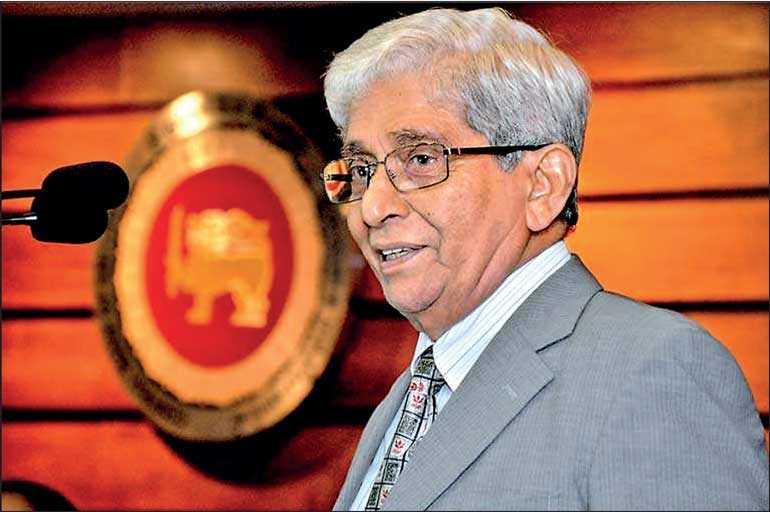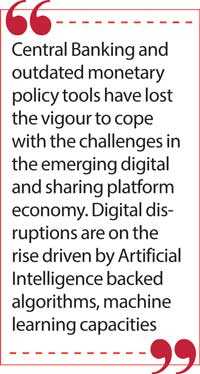Tuesday Feb 24, 2026
Tuesday Feb 24, 2026
Friday, 17 January 2020 00:07 - - {{hitsCtrl.values.hits}}

An eminent economist; Prof. W.D. Lakshman has been appointed as the new Governor of Central Bank of Sri Lanka. At the outset, President Gotabaya Rajapaksa seems to carefully select professionals to lead the poorly managed State-owned institutions in Sri Lanka. A step in the right direction. On the  same note; appointing two professionals as Chairmen of the Board of Directors of the two State-owned Bank of Ceylon, and Peoples’ Bank deserves commendation.
same note; appointing two professionals as Chairmen of the Board of Directors of the two State-owned Bank of Ceylon, and Peoples’ Bank deserves commendation.
Governor Lakshman thanked the outgoing Governor Dr. Indrajith Coomaraswamy for the contributions during his tenure, on assuming duties on 24 December 2019. This was possible because unlike in the past, Governors did not abruptly end their position having been in the comfort zones of politicians.
Identifying himself as a social democratic to the core; the new Governor will undoubtedly address the core issues stalling the economy as consequences of neo-liberal policy divergences; amongst many, the worsening financial deficits in the country resulting from the mismatch between the public expenditure and the tax revenues generated ballooning the debt burdens.
What is most striking to note, as reported in the media, that Governor Lakshman’s admission that he has limited exposure to the Central Banking, aside from the theoretical knowledge. Perhaps the Governor Lakshman could take few clues from the experiences of Central Banking; very well narrated by Bank of England former Governor Lord Mervyn King in his book, ‘The End of Alchemy-Money, Banking and the future of Global Economy’.
Central Banking and outdated monetary policy tools have lost the vigour to cope with the challenges in the emerging digital and sharing platform economy. Digital disruptions are on the rise driven by Artificial Intelligence backed algorithms, machine learning capacities. The next wave distributive ledger systems known as blockchain technology is on the horizon. BlockChain is indeed to change the landscape of the existing capital markets operations.
Robbing banks from inside was the name of the game that paved the way for the 2008 financial crisis unfolded in the industrialised countries in Europe and North America. Although the hallmarks of insider deals, trading, profit engineering for short term gains were commonly seen in the global north, the same unethical conducts and questionable behaviours of the top bankers, including the former Governor Arjun Mahendran were striking in Sri Lanka. 
The politicians of all colours abused their power to appoint their proxies to head the State-owned financial institutions including the Central Bank in the past, purely to rob banks from the inside and left those organisations in dire status. The trust deficiencies arisen due to these unethical practices have caused severe impediments to banks in their traditional role; financial intermediation.
Banks are losing prominence and power as the new digital giants are coming up with innovative solutions to offer financial services to the community. As reported in the media there some amendments being proposed to change the Banking Act; it is prudent that the proposed amendments assess the trends of future banking in the light of the digital disruption now spearheading the changes.
The finance industry is the operating system of the entire economy. Mobilising savings for investment, managing credit to stimulate the economy and most importantly linking the producers and the consumers in the real economy rest in the financial system.
Unfortunately, it is now evident that this operating system is under severe virus attack. The two viruses impacting heavily and needs to be quarantined are; corruption in the public sector and the greed in the private sector. Imagine if your computer operating system is under a virus attack, the consequences to the hardware, software and to those who relate to your equipment.
There appears to be an urgent need to invent an effective virus guard to control the contagious impact across the economy. Central Bank, as the regulator, should spearhead a campaign to develop an effective virus guard, together with firewalls in collaboration with professional institutions. Sri Lanka needs to tap on the SMART technologies for this purpose swiftly.
The new Governor will soon realise the economic theories of the first industrial revolution era is toothless to address the challenges of the 21st century; where digital disruptions are challenging the business models of the traditional banking and finance industry.
There is an urgent need to identify the new performance and productivity measuring parameters that are compatible with the fourth industrial revolution era, where data analytics supported with artificial intelligence and machine learning has become the driving force.
Return on investment, as a measure of deployed capital, has its limitations in economies where the impotent debt volume surpasses the real money available in the marketplace. During the first industrial revolution, era capital was the most scared economic factor input.
In the current fourth industrial revolution era triggered by the knowledge economy; talent, skills encapsulated as human or intellectual capital is in scarcity. SMART technologies, mobile phones are the new platforms identified to deliver new customer services and knowledge and expertise, competencies will be sought after by all the tech companies who have become giants as ungovernable organisations globally.
Putting good money behind sunk money is not a good business proposition. Banks are forced to prop up their tier 1 and 2 capital as per the Basle guidelines, whereas the Central Banks in Europe and North America is pumping cheap money in the name of quantitative easing.
This writer has argued that the Basle guidelines set by industrial countries; for their advantage in the North have been a significant contributory factor to ignite the financial crisis of 2008. Quantitative easing was targeted to stabilise the financial markets in Europe and North America by subsidising the 1% super-rich to keep the capital markets breathing.
Governor Lakshman will soon realise that the role of Central Bank as the lender of last resort will become irrelevant. The Government of India has now introduced the Financial Sector Development Regulation and Restoration bill (FSDR 2019). This has been done to bypass the Reserve Bank of India (Central Bank) for the restoration of ailing, weak commercial banks.
Moreover, when printing of money to facilitate commerce in the economy is most likely to be replaced with digital payment and settlements through internet-based SMART devices. The economic impact of unconventional monetary policies of the central banks may lead to another financial crisis and could also make central banking obsolete.
To conclude and support the arguments stated, let me quote some facts and figures from Singapore. The Monetary Authority of Singapore (MAS) announced to issue five digital banking licenses in June 2019. The five licenses consist of three wholesale digital bank licences and two full digital bank licences.
There are 21 bids received by MAS, those who have expressed interest represent conglomerates from e-commerce firms, technology and telecom and FINTECH companies. These digital banks are to commence operations by mid-2021. In the current ear of acceleration; technology has no geopgraphic boundaries, and today virtual connectivity supersedes the sovereignty of nations.
(The writer is the Regional Director responsible for Finance Sector; working with UNI Global Union Asia and Pacific Regional Organization in Singapore and can be reached at [email protected].)